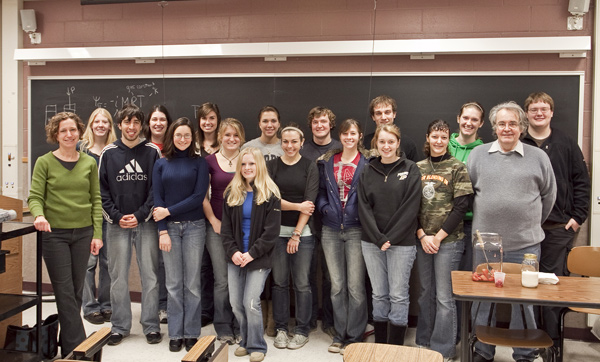New CAPSiE laboratory
01-15-2010

Society faces a number of grand challenges including a need for new energy sources, more effective and economical healthcare solutions, and environmentally friendly and sustainable technologies. The life science students who will be responsible for solving the global challenges of tomorrow need a different type of education today. An appropriate life science education model – one that supports discovery as a culture – will certainly require an emphasis on components such as training in interdisciplinary collaborations and increased focus on quantitative and computer-based tools. Equally important in that education will be earlier opportunities for research experience.
The Department of Biological Sciences has received support from NSF to adapt an established, successful model of incorporating research into chemistry laboratory courses (from the Center for Authentic Science Practice in Education, "CASPiE") into a first-year biological science laboratory course. The overarching goal is to advance students' understanding of the scientific method, biological research and its products. Simultaneously, the method should improve their ability to communicate scientific data and principles at an early stage in their undergraduate education. Three new biological modules will be developed, aiding the research of three different faculty members, in the following areas: bacterial genetics, neuro-anatomy, and population biology. Each module allows the students to work in teams to analyze preliminary results, use such results to revise the experimental design for further inquiry, and collectively summarize the conclusions of the research and present final results in poster format. The modules can be used in multiple years and shared with other institutions.
The grant to Dennis Minchella (Professor of Biological Sciences), Stephanie Gardner (Continuing Lecturer in Biological Sciences), Gabriela Weaver (Professor of Chemistry) and Jason Curtis (Associate Professor of Biology at Purdue North Central) will allow first-year students on two Purdue campuses an opportunity to contribute to faculty-guided projects. The team believes that a research-based learning experience can not only provide basic skills for students, but also enhance students' scientific understanding and their ability to communicate science. In addition, early exposure to research in an undergraduate program should improve both student retention in science and their willingness to seek out independent research experiences.